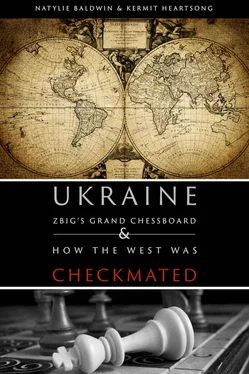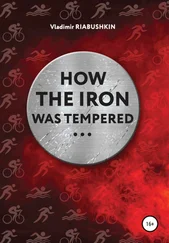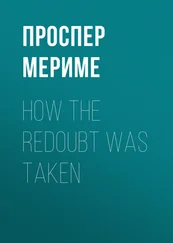Kermit Heartsong - Ukraine - ZBIG's Grand Chess Board & How The West Was Checkmated
Здесь есть возможность читать онлайн «Kermit Heartsong - Ukraine - ZBIG's Grand Chess Board & How The West Was Checkmated» весь текст электронной книги совершенно бесплатно (целиком полную версию без сокращений). В некоторых случаях можно слушать аудио, скачать через торрент в формате fb2 и присутствует краткое содержание. Год выпуска: 2015, Жанр: Политика, на английском языке. Описание произведения, (предисловие) а так же отзывы посетителей доступны на портале библиотеки ЛибКат.
- Название:Ukraine: ZBIG's Grand Chess Board & How The West Was Checkmated
- Автор:
- Жанр:
- Год:2015
- ISBN:нет данных
- Рейтинг книги:4 / 5. Голосов: 1
-
Избранное:Добавить в избранное
- Отзывы:
-
Ваша оценка:
- 80
- 1
- 2
- 3
- 4
- 5
Ukraine: ZBIG's Grand Chess Board & How The West Was Checkmated: краткое содержание, описание и аннотация
Предлагаем к чтению аннотацию, описание, краткое содержание или предисловие (зависит от того, что написал сам автор книги «Ukraine: ZBIG's Grand Chess Board & How The West Was Checkmated»). Если вы не нашли необходимую информацию о книге — напишите в комментариях, мы постараемся отыскать её.
Ukraine: ZBIG's Grand Chess Board & How The West Was Checkmated — читать онлайн бесплатно полную книгу (весь текст) целиком
Ниже представлен текст книги, разбитый по страницам. Система сохранения места последней прочитанной страницы, позволяет с удобством читать онлайн бесплатно книгу «Ukraine: ZBIG's Grand Chess Board & How The West Was Checkmated», без необходимости каждый раз заново искать на чём Вы остановились. Поставьте закладку, и сможете в любой момент перейти на страницу, на которой закончили чтение.
Интервал:
Закладка:
NATO: From Cold War to Global War
The refusal in Washington to give up the Cold War mentality was foreshadowed as early as 1989, as Russia scholar Stephen Cohen relates in describing his debate, at the invitation of the White House, with Cold-War professor Richard Pipes over the possibility of a US-Soviet strategic partnership: “Declarations alone could not terminate decades of warfare mentality… Many of the top level officials present clearly shared my opponent’s views, though the President did not” (Cohen 2011).
This residual Cold War mentality, along with the profit motive of the military-industrial complex and the ideological mix of Neoconservatives, humanitarian interventionists, and Grand Chessboard advocates who wielded influence, doomed the possibility of a true rapprochement between the US and Russia as well as a more cooperative international framework. Indeed Brzeziński himself had stated publicly in the 1990s that the fate of NATO was either to expand or become obsolete. In 1997, he went further by claiming that NATO preservation was “vital” to keeping the US relationship with Europe to the US’s advantage on the Eurasian “chessboard” (Brzeziński 1997).
NATO in the 1990s
Laying the Groundwork for Expansion
If we treat Russia as irredeemably hostile, then we will initiate a self-fulfilling prophecy …we must engage Russia instead with a clear determination to foster security cooperation. As we approach the 21 stcentury, the main task of Europe is to find a place for Russia. This was done for Germany in the post-Second World War period. If they can’t for Russia, Central Europe will return to being what it was during the interwar period, the chessboard of European powers.
— NATO Secretary General Willy Claes, Munich Security Conference, 1995 (Federation of American Scientists)
In 1991, President George H.W. Bush was determined to “kick the Vietnam Syndrome.” In other words, he wanted the American public to get over its apprehension toward military intervention overseas that had resulted from the long, brutal and increasingly dubious war in Vietnam. On behalf of that goal, Bush rejected proposals for Iraq’s withdrawal from Kuwait, including one brokered by Gorbachev and supported by US military leaders, after a destructive Coalition bombing campaign. Bush saw a ground war as an opportunity for a cheap and easy victory against weakened Iraqi forces (Parry 2014).
NATO had quietly participated in the military operations that comprised the Iraq War (or Gulf War I). This motivated military leaders in both the Pentagon and NATO to consider expanding its use in other geographic and operations areas outside of its stated jurisdiction.
Meanwhile, certain political insiders were already angling for NATO expansion. For example, an ethnic lobbying group called the Polish American Congress (PAC) called for Poland’s entry into NATO at their National Directors Meeting in June of 1991, six months before the dissolution of the Soviet Union. In September, they also called for the entry of Hungary and Czechoslovakia — also known as the Visegrad Group of nations (Poland, Hungary, Czechoslovakia, or later Czech Republic and Slovakia). One of PAC’s most prominent members and a major advocate of NATO expansion was Jan Nowak who had worked for years for Radio Free Europe until it was exposed in the 1970s as a CIA propaganda outlet. After leaving Radio Free Europe he went on to serve as an advisor to the Carter administration, including to his friend Zbigniew Brzeziński (Polish American Congress; Gati 2013; Lukasiewicz 2014).
In the autumn of 1993, PAC stepped up its advocacy for NATO enlargement by adopting a resolution to push the US government to facilitate Poland's entry into the alliance as soon as possible. A strongly worded letter enclosing a copy of the resolution was sent to President Clinton on October 28 th(Polish American Congress).
The following month, an article appeared in the Washington Post about the contents of another article by a history doctoral candidate named William Larsh. Larsh's obscure piece, published in an academic journal, was critical of WWII-era diplomat Averell Harriman, asserting that Harriman was naïve about Stalin and facilitated a deal to replace the previously recognized government of Poland with Stalin's puppet leaders in the days when the war was winding down. This was followed up by another article in the Washington Post ten days later, “Ghost of Yalta,” in which the authors reiterate the theme of the sell-out of Poland by the Roosevelt administration during the resolution of Allied boundaries at the close of the war in Europe (Polish American Congress).
In reality, it was British Prime Minister Winston Churchill who paved the way for Soviet control of Eastern Europe, including Poland, when he sent his foreign minister, Anthony Eden, to Moscow to propose a deal with Stalin. In exchange for control of Eastern Europe, Britain would have control of Greece, an important geostrategic buffer for Churchill. Stalin was receptive and Churchill flew to Moscow in October of 1944 to seal the deal — six months before Yalta (Polk 2014).
Nevertheless, these articles helped to gain traction for the “not another Yalta” meme that would follow, which had its genesis among members of the political class that emerged from post-Soviet Central and Eastern European nations, such as Vaclav Havel, who was a Czech dissident playwright. While Poland and Czechoslovakia both had a long history of being carved up and subjugated among various empires, unlike the aftermath of WWI or WWII when the victors drew up borders based purely on their own interests, the USSR/Russia peacefully withdrew all its troops from East Germany and the other satellite countries of Central/Eastern Europe under voluntary agreement at the end of the Cold War. Therefore, to compare the release of the Central/Eastern European nations from Soviet control to the Yalta conference of WWII is problematic — even more so as time goes on, when every Russian leader since Gorbachev has stated that they wanted to be part of the West — albeit as a partner, not a vassal.
Furthermore, Havel’s views did not represent a monolithic view about how to best secure the futures of Poland, Czechoslovakia, and Hungary among Soviet era dissidents in these countries. For example, some wanted to strengthen the Organization for Security and Cooperation in Europe (OSCE) in the hopes of eventually creating a pan-European arrangement that included Russia (the USSR was already a member as would be its successor state the Russian Federation), replacing both NATO and the Warsaw Pact. But the approach advocated by Havel to enlarge NATO to include these three nations, which would conveniently maintain the US’s dominant role in European security, quickly won the day among the new leadership of these countries.
The Clinton administration, taking the helm at the beginning of 1993, did not jump at this proposal to enlarge NATO; in fact, only National Security Advisor Anthony Lake really supported the idea in the beginning. Elements in both the State Department and the Pentagon were initially leery of taking on the added burden of providing security for the Central/Eastern European states. Also, it was recognized that NATO enlargement would complicate Clinton’s foreign policy priority of assisting post-Soviet Russia in its transition to market democracy. Eventually, Havel of the Czech Republic, Lech Wałęsa of Poland, and Arpad Goncz of Hungary played on Clinton’s neo-Wilsonian philosophy of the need to facilitate the spread of “democracy” and sold the president on the convoluted belief that inclusion of their respective nations in NATO would prove their credentials as Western market democracies and would encourage Russia on its own path toward democracy. Clinton subsequently expressed openness toward eventually allowing these nations into the alliance. The narrative of NATO’s purpose also began to change from that of a Cold War defensive alliance to that of “an inclusive alliance protecting the democratic states and open societies of the continent” (Asmus 2002).
Читать дальшеИнтервал:
Закладка:
Похожие книги на «Ukraine: ZBIG's Grand Chess Board & How The West Was Checkmated»
Представляем Вашему вниманию похожие книги на «Ukraine: ZBIG's Grand Chess Board & How The West Was Checkmated» списком для выбора. Мы отобрали схожую по названию и смыслу литературу в надежде предоставить читателям больше вариантов отыскать новые, интересные, ещё непрочитанные произведения.
Обсуждение, отзывы о книге «Ukraine: ZBIG's Grand Chess Board & How The West Was Checkmated» и просто собственные мнения читателей. Оставьте ваши комментарии, напишите, что Вы думаете о произведении, его смысле или главных героях. Укажите что конкретно понравилось, а что нет, и почему Вы так считаете.











